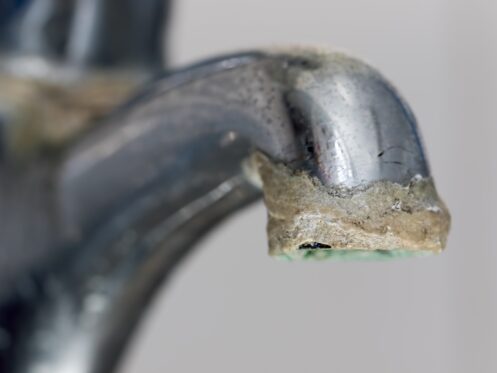While Florida has nice sunny beaches that can make most of the year an enjoyable time, one unfortunate attribute of this state is dealing with hard water. Florida has a very high concentration of limestone that naturally seeps excess minerals into the natural water supply.
Understanding what hard water is and how it can impact your home is the first step in successfully combating it.
What Is Hard Water?
Simply put, hard water is water with a high concentration of minerals like magnesium and calcium. There are different hardness levels your water can have depending on the concentration. Any water testing that reveals your water is in the hard or above level means you need to address the excess minerals.
Why Is Hard Water Bad?
There’s no doubt that hard water is completely safe to drink and use for things like bathing or cleaning. However, the excess minerals in hard water can have a significantly negative impact on your appliances, plumbing fixtures, piping, and even your skin and hair. The high presence of minerals causes premature deterioration of the metal components in your plumbing fixtures and appliances. They also dry out your skin and can cause your hair to frizz.
Signs You Have Hard Water
There are many different indicators that will reveal you have hard water in your home. One of the most obvious is limescale buildup on your plumbing fixtures. This is a white scaly scum that stays on the surface of all your fixtures and that’s made of dried minerals. This mineral content can make it overly challenging to lather up your dishes, clothes, and skin because it makes your cleaning products less effective.
You’ll likely notice your laundry feels stiff. Hard water also strips away the natural oils of your skin and hair, leading to itchiness and dryness. If you’re not sure if your home has hard water, consider getting a water quality assessment. This type of professional testing from an expert plumber will reveal the hardness level of your home’s water supply.
How to Combat Hard Water
Once you verify you have hard water, the next thing you want to do is be proactive in combating it. One of the best ways to rid your home of hard water is to install a water softener system. This device treats the water coming into your home before it arrives at all your plumbing fixtures and appliances.
A water softener uses ion exchange technology to pull minerals out of your water and replace them with sodium. As water enters the water softener tank, it flows through a series of resin beads. These beads are pre-charged with a sodium ion to attract the unwanted magnesium and calcium molecules in your water.
As these mineral molecules bond to the resin beads, the sodium ion releases into the water. Your now soft water continues its journey out of the water softener system and to all your plumbing fixtures and appliances. Every so often, the water softener will flush a specialized brine solution through the resin beads to remove the unwanted calcium and magnesium molecules and recharge all the beads with sodium ions.
Maintenance Requirements
To keep a water softener in tip-top condition, it needs to receive routine maintenance and upkeep. One crucial step all homeowners will need to keep up with is maintaining an adequate salt level. Ideally, you’ll want to check your water softener salt tank once a month to see if it is low. If the tank is below half full, it’s best to add more salt to it.
It’s very important to make a clear distinction that water softener systems don’t use traditional table salt. Rather, they use a high-purity salt pellet that’s specialized to work within the water softener. This type of salt works to minimize the amount of residue that’s left behind, which is necessary for efficient system performance.
When you’re checking the salt level in your water softener, keep an eye out for any hard crusting of the salt in the tank. These are referred to as salt bridges and can reduce the efficiency of your system. If you have any of them, break them up to increase system functionality.
We highly recommend getting professional service for your water softener annually. This will include inspecting all its internal components, thoroughly cleaning them, and repairing any defects.
Longer Lifespan of Your Plumbing System
One of the most significant benefits of investing in a water softener system for your home is it will extend the lifespan of all your plumbing system’s components and appliances. From your sink fixtures and shower heads to your water supply lines and water heater, removing that excess sediment will prevent unwanted deterioration. The longer your system’s components last, the less money you’ll need to spend on upgrades.
Healthier Skin and Hair
Hard water can take a big toll on your body. From dry itchy skin to frizzy hair, it can be a real pain dealing with hard water routinely. A water softener will eliminate that invisible limescale buildup that would otherwise strip away your body’s natural minerals. This will leave your skin feeling smoother and more moisturized. You’ll likely even notice that your hair won’t consistently frizz, as it keeps more of its natural oil.
More Effective Cleaning
One very noticeable benefit of a water softener is the effectiveness of your cleaning products. It won’t take long before you notice your laundry is not only brighter but softer. Your dishes won’t end up with pesky white spots, and you’ll use less soap and shampoo to clean your body. The more effective your cleaning products are, the less of them you have to use which means more money savings for you.
More Efficient Water Heater
Hard water takes more energy for your water heater to get up the temperature than soft water. This leads to higher utility bills and will ultimately shorten the lifespan of your water heater. Fortunately, using a water softener to remove those excess minerals before your water supply reaches your water heater can be an ideal solution to more efficient water heater operation and a longer usable lifespan.
Tips on Selecting a Water Softener System
When you decide a water softener system is beneficial for your household and you want to purchase one, there are some factors you’ll want to take into consideration. One of the most vital is the size of the water softener. Water heaters have a grain capacity rating that describes how much water they can treat in a given day.
The amount of water you use and the hardness of that water will impact what size system you need. Our experts can do a thorough assessment of your home and recommend the best size water softener to meet your needs. Some other notable factors to consider are the regeneration method it uses, salt or salt-free systems, ease of maintenance, upfront price, and warranty coverage.
Expert Water Softener Service
Plumbing, Cooling & Electrical Nerds provides expert water softener service for the Bonita Springs, FL community. We can also help with all your reverse osmosis and carbon filter whole-home water filtration needs.
Simply call our office today to schedule your next service consultation.

